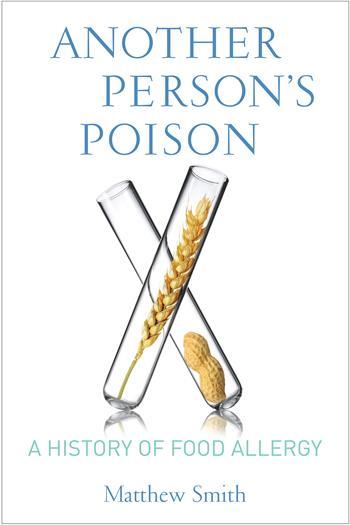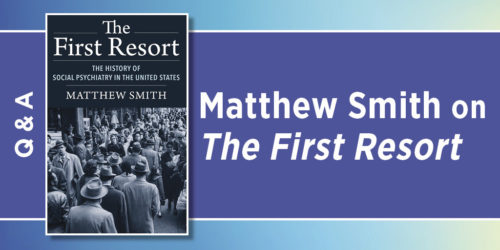What History Can Tell Us About Food Allergy — Matthew Smith
“If we want to know anything about the health issues that face us today and will face us in future, the very first thing we should do is turn to the history of such issues.”—Matthew Smith
The following post is by Matthew Smith, author of Another Person’s Poison: A History of Food Allergy:
What can the history of medicine tell us about food allergy and other medical conditions?
An awful lot. History is essentially about why things change over time. None of our ideas about health or medicine simply spring out of the ground. They evolve over time, adapting to various social, political, economic, technological, and cultural factors. If we want to know anything about the health issues that face us today and will face us in future, the very first thing we should do is turn to the history of such issues. This is particularly important if we are dissatisfied with current ways of thinking about and treating particular conditions (as I have argued in the past with respect to ADHD or hyperactivity) or if we are bamboozled by the causes and deeper meaning of other conditions, such as food allergy. Otherwise, we are uninformed and highly likely to repeat the mistakes of the past.
A few weeks ago, my 16-month-old daughter broke out in spots. As the parents of two remarkably healthy children, my wife and I were bemused. Our first thought was that she may have come down with chicken pox, a real pain, but not the worst thing in the world. We looked up some of the early symptoms of chicken pox online, which appeared to confirm our suspicions and steeled ourselves for a week of scratching and crying.
The following morning however, the spots had disappeared. We were flummoxed. Could chicken pox be a 24-hour thing? No such luck. Then, I remembered that I was the author of a book on food allergy. Could it have been something she ate? I tried to think about what she had been eating and then it struck me: strawberries.
Scottish people are often maligned for never eating fruits or vegetables. While this is true for some people, the traditional Scottish diet is actually chock-full of healthy foods. The cold and rainy climate allows us to grow plenty of neeps (turnips) and tatties (potatoes), for instance, and there is also a thriving berry industry in places such as Perthshire, and strawberries are central to this. Every year, when the sun shows its face and the buds begin to emerge, the first punnets of strawberries emerge in supermarkets. And we dutifully buy them up, gobbling up strawberries as fast as we can.
Although these days, thanks to greenhouses and breeding, the strawberry season can last well into the autumn, traditionally, it was short, so people needed to get strawberries while they could. Possibly because of this overconsumption of strawberries at one time of year, symptoms attributed to strawberries are one of the most common instances of bizarre reactions to foods found in literature prior to 1906, when the term allergy was coined. Sir Thomas More even claimed that none other than Richard III took advantage of the fact that strawberries gave him a rash for political gain. In his History of Richard III, More states that surreptitiously consumed some strawberries and then blamed the rash that followed on witchcraft orchestrated by one of his political opponents, Lord Hastings. Hastings was summarily executed.
Hoping that my daughter would never take advantage of her apparent sensitivity to strawberries, we stopped buying them for a couple of weeks. Then, we decided to conduct an experiment, and gave her a few. No rash. We waited another day or so and gave her a few more. Nothing. Although we were relieved in one way, we remained bewildered. Perhaps something else caused the rash? Or maybe the reaction was temporary or caused by eating way too many strawberries. Maybe it was some kind of intolerance, and not an allergy at all? It might be tempting to gravitate toward such an answer, but a quick look at many allergy websites suggests otherwise. Strawberries, they say, are not only common allergens, but reactions to them might be a harbinger of allergies to pineapples, kiwis, and other fruits. So what to do?
My research suggests that millions of parents have wrestled with such dilemmas in the past, and continue to do so today. Since food allergies can be interpreted by people (including physicians) alternatively as either deadly serious or completely overblown, it is difficult for parents to know what to do. Making matters more complicated is the fact that many allergies are known to fade away as children get older. I would be loath to give any sort of medical advice, but I hope it is some solace to parents these conundrums are not new. And, in the words of Dr Spock, parents should also trust themselves to a large degree with respect to their children and possible allergies.






1 Response